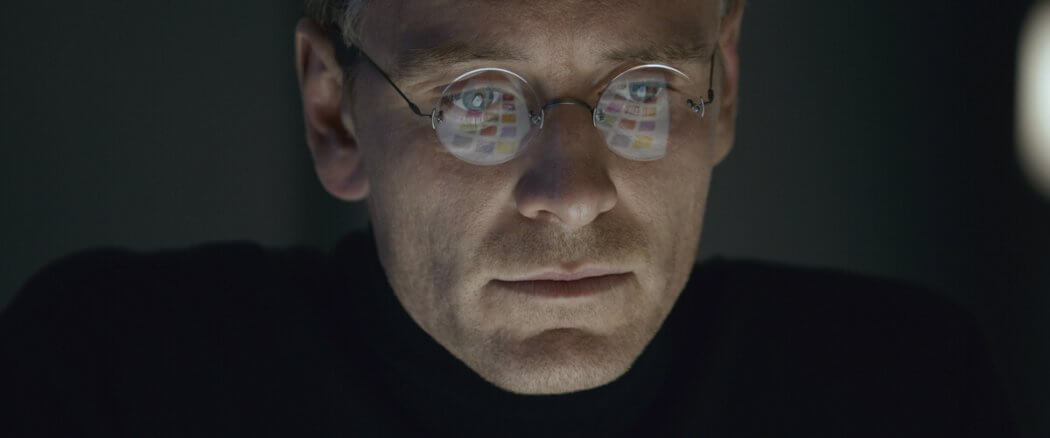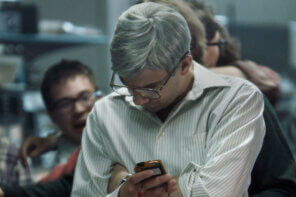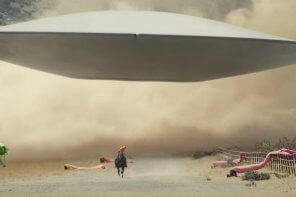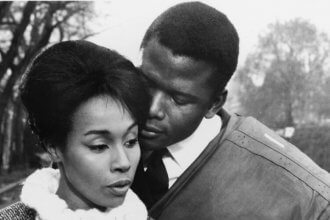Steve Jobs boots up fast. We open to the man of the hour as he stares at a computer screen with a scowl. Something’s not right. The music swells with urgency. We see an auditorium filling up behind him, but the show can’t start until Jobs is satisfied. He walks backstage – a moving conductor of chaos. Jobs is the boss in Brazil who marches through the office all day surrounded by questions. He likes it though. This is his kingdom. He shouts orders and the worker bees comply.
The energy of the scene is electric. Jobs fires off quip after quip in manic speeches, barely pausing to take a breath. His assistant fires back, clearly the only one capable of doing so. They walk through long corridors, gliding from one room to the next, the roar of the crowd growing louder outside. At any moment, we expect for the scene to end and transition to something resembling a beginning. We expect a title card on black followed by a long, deep pause. But the pause never comes, and that’s when we realize the whole movie will be like this. This isn’t a biopic or a history lesson. Steve Jobs is a movie about a man in the moment, getting ready to stand on a stage and conquer the world.
Reboot
If you think this film sounds familiar, you’re probably remembering 2013’s Jobs (not that Jobs was very memorable). Steve Jobs is a talent upgrade in every way. Instead of Ashton Kutcher playing the title role, we now have Michael Fassbender – not to mention Aaron Sorkin writing the screenplay, Danny Boyle behind the camera, and Kate Winslet in a supporting turn. Here’s the bummer though: Steve Jobs isn’t that much better than Jobs. They both fall short in different ways.
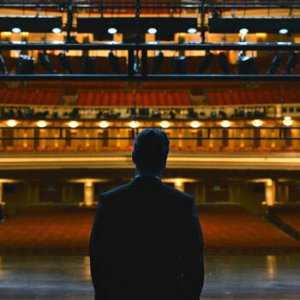 Jobs was too generic. Ashton Kutcher gave the role his all, but still couldn’t achieve a three-dimensional character. And the movie was as conventional as biopics come. Steve Jobs, on the other hand, is too specific. The film consists of three backstage moments in the life of Steve Jobs. We see some flashbacks, but for the most part, the movie is Jobs walking through corridors preparing for product launches. The limited format keeps the film from truly soaring.
Jobs was too generic. Ashton Kutcher gave the role his all, but still couldn’t achieve a three-dimensional character. And the movie was as conventional as biopics come. Steve Jobs, on the other hand, is too specific. The film consists of three backstage moments in the life of Steve Jobs. We see some flashbacks, but for the most part, the movie is Jobs walking through corridors preparing for product launches. The limited format keeps the film from truly soaring.
Every aspect of Steve Jobs feels like one long note. It’s an interesting note, but I was expecting a symphony. What you see in the first five minutes, is what you get for the next two hours. Fassbender masters Jobs’ cocky self-importance, but his character lacks an arc. Winslet’s talents are equally under-utilized as Jobs’ assistant, Joanna. She provides a necessary soundboard for Jobs, but that’s precisely the problem – she’s a stand-in, not a character.
Steve Jobs is like the indie version of Jobs. They both leave us with the same empty feeling. “That was pretty good,” we say, before shrugging and moving on to something else. With a talent differential this high, that’s a real shame.
Admin
Steve Jobs was a jerk. The movie leaves no doubt of that. When one of his employees can’t perform a last minute tweak for a presentation, Jobs threatens to publicly humiliate him on stage in front of thousands. His standard is perfection, and he demands it of everyone. Even if you measure up, he still might steal your work and take the credit. And no one is immune from his scathing tongue. He belittles his daughter for talking over people without listening to them – the same thing he does all the time. He spews long, acidic speeches of ego, always with a twinkle in his eye, as if he thinks everyone around him finds his antics cute and charming.
Steve Jobs was also a genius. Not at hardware, but at design. His employees were often more skilled than he was at computer engineering, but he took their crude creations and turned them into art. Jobs didn’t sell a product, he sold a lifestyle. What was under the hood was less important than the look of the hood itself. He wanted people to feel like they were using something special.
Screens
Steve Jobs opens with a black and white clip of a technology expert discussing the future of computers. The man stands in front of a box the size of a filing cabinet and makes the claim that machines like this will be in every home. The newscaster asks about the potential dangers of a life surrounded by computers. It’s a great question – one I wish Steve Jobs had explored.
Think about how much we interact with computer screens on any given day. I roll over in the morning and shut off an alarm clock on my phone. A news story greets me on the lock screen. I launch my Bible app to read a morning Psalm. I spend the day at work interacting with a desktop monitor. On my lunch break, I scroll through Facebook. In the afternoon, I call my wife. When I get home, I respond to e-mails. Before bed, I set my alarm again. Screens. Screens. Screens. Computers rule our lives. Congratulations Jobs, you won.
 Technology is the golden calf of modern society. Our devices are shiny and we think they will save us. The appeal is more than functionality. If computers were still the size of filing cabinets with harsh green letters, I don’t think we’d care as much. We love technology because it’s cool. Steve Jobs made that happen. It’s the little things. The way an app swooshes toward me as it opens. The way the pages glide as I swipe them. These are the things Jobs cared about, because he knew they made all the difference.
Technology is the golden calf of modern society. Our devices are shiny and we think they will save us. The appeal is more than functionality. If computers were still the size of filing cabinets with harsh green letters, I don’t think we’d care as much. We love technology because it’s cool. Steve Jobs made that happen. It’s the little things. The way an app swooshes toward me as it opens. The way the pages glide as I swipe them. These are the things Jobs cared about, because he knew they made all the difference.
But this innovation comes at a price. We’ve engineered our entire existence around computers. If terrorists found a way to shut down the internet, they’d unleash Armageddon. The banks would fall. Wall Street would crumble. Society would collapse. We’d all feel a gaping hole in our lives. I notice it even now. When my iPhone breaks, I feel like crying. That’s a problem. Steve Jobs would happily take credit for this, but it’s really not his fault. There’s something inside of me that likes glowing screens more than God. How do we foster a “take it or leave it” attitude with computers as our lives increasingly need them? That’s the question we all must answer.
Shut Down
Steve Jobs is a good film, but it should have been a masterpiece. Boyle has made more than one in his career, and all the ingredients are here. The movie aims too small. I felt the same way about The Social Network. I still remember a teaser for that film made up entirely of Facebook feeds and Radiohead’s Creep. I expected a blistering commentary on our social media society. Instead, I got a movie about Mark Zuckerberg inventing Facebook. The Social Network is a better film than Steve Jobs, but they both miss greatness for the same reason. They highlight the creators without exploring their creations.
Still, the movie provides us with a glimpse of Jobs we haven’t seen before. Behind the creativity and innovation, was a selfish, brutal tyrant who used his friends and hurt his family. Did Jobs mend his ways? The movie offers hope, but not true change. I hope so, because at some point, all the swirling energy of Jobs’ life came to a screeching halt. No more products to launch. No more people to talk to. No more hallways to walk down. Suddenly, there was just a man breathing his last breath on earth. Was he surrounded by people who loved him? Or was a MacBook his only friend?

